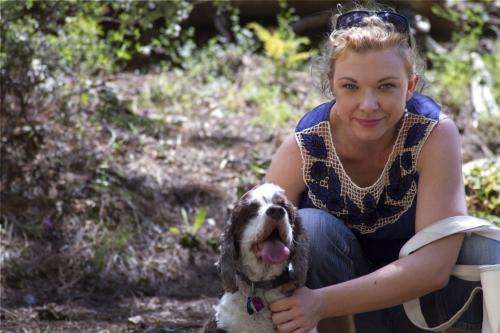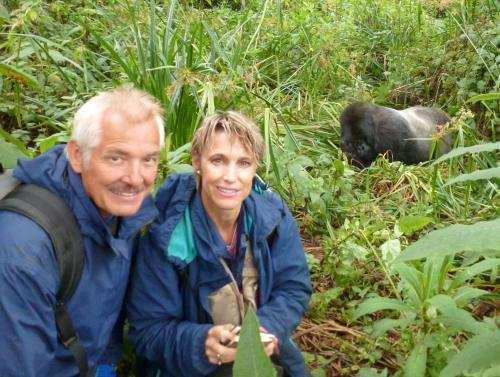Credit: Thomas Leuthard
Most dog owners will tell you their furry friends make them feel good emotionally. But the health benefits of owning a dog may not end there.
Researchers at the University of Arizona are recruiting participants for a study exploring whether dogs can improve human health by having a probiotic effect on the body. The research will focus specifically on dogs' effect on the health of older adults.
"We've co-evolved with dogs over the millennia, but nobody really understands what it is about this dog-human relationship that makes us feel good about being around dogs," said Kim Kelly, an anthropology doctoral student and one of the primary investigators on the study. "Is it just that they're fuzzy and we like to pet them, or is there something else going on under the skin? The question really is: Has the relationship between dogs and humans gotten under the skin? And we believe it has."
The study is the first conducted under the UA's new Human-Animal Interaction Research Initiative, part of the Frances McClelland Institute for Children, Youth and Families in the John & Doris Norton School of Family and Consumer Sciences. The initiative aims to bring together researchers across disciplines to explore the mutual benefits of human-animal relationships for health and well-being.
Dogs and 'Good' Bacteria
The human digestive system is home to more than 500 different types of bacteria, both "good" and "bad." Probiotics often are called "good" or "helpful" bacteria because they help keep the intestines healthy and assist in digesting food; they also are believed to help the immune system. Foods such as yogurt, as well as supplements, can help enhance probiotics in the body.
Kelly, along with her collaborators in the UA Department of Psychiatry, the UA Norton School of Family and Consumer Sciences, the UA School of Animal and Comparative Biomedical Sciences, and the University of California at San Diego, will explore whether living with a dog encourages the growth of positive microorganisms in the human gut—enough to improve physical and mental health in older adults.
"We essentially want to find out, is a dog acting like yogurt in having a probiotic effect?" said Kelly, who also is a principal research specialist in the Department of Psychiatry and program coordinator for the Human-Animal Interaction Research Initiative.
Kim Kelly with her dog, Katie
Existing research shows that dogs and their owners share much of the same gut bacteria over time. In addition, some studies have shown that dogs enhance immune functioning in children, reducing the risk for immune disorders, such as asthma and allergies.
"We think dogs might work as probiotics to enhance the health of the bacteria that live in our guts. These bacteria, or 'microbiota,' are increasingly recognized as playing an essential role in our mental and physical health, especially as we age," said Dr. Charles Raison, principal investigator for the study and a UA professor of psychiatry in the College of Medicine.
"We know that not all bacteria are good. We can get very sick from the 'bad' bacteria, and modern medicine has done a wonderful job of protecting us from various diseases that are created by these bacteria," said Raison, also a professor of family and consumer sciences. "But unfortunately, by eliminating the bad bacteria we've started eliminating the 'good' bacteria, too."
Participants in the study, which is being conducted in partnership with the Humane Society of Southern Arizona, will be paired with a canine companion from the humane society and live with the dog in their home for three months.
At the beginning of the study, researchers will non-invasively evaluate the human participants' gut bacteria, diet, physical activity levels and immune function. The dogs' gut bacteria and physical activity levels also will be measured via non-invasive means. Follow-up evaluations will take place after one, two and three months to look for any positive impacts on gut microflora in either the humans or the dogs. Researchers also will note any changes in the mental health and emotional well-being in both the humans and the animals.
Study participants must be age 50 or older, in good general health, not have taken antibiotics in the past six months, and not have lived with a dog for at least six months. Participants will be able to identify what type of dog they would like and will be able to adopt the dog at the end of the study, but that isn't a requirement for participation. Food and veterinary care for the dog will be provided during the study period.
Study First in Series of Projects
Dieter and Netzin Steklis
Anecdotal evidence abounds about the benefits of human-animal relationships. And research has shown that people who own dogs are happier, less stressed and even less likely to die of heart disease. Yet there is limited scientific research on why these relationships are so beneficial.
The dog study is just the first in a series of projects under the UA's Human-Animal Interactions Research Initiative designed to gather scientific data in this area.
The Human-Animal Interaction Research Initiative, or HAIRI, was started by UA husband-and-wife researchers Dieter and Netzin Steklis, who are co-investigators on the dog study and who teach at UA South and in the Norton School of Family and Consumer Sciences in the College of Agriculture and Life Sciences.
"Our emphasis with HAIRI is first to bring good rigorous science to understanding the relationship between humans and non-human animals," said Netzin Steklis, a lecturer in family and consumer sciences. "Then we can use that to contribute to the education of, for example, future veterinarians or family therapists or the pet industry. We want to extend this research into practice through education and outreach."
Additional research projects in the works under HAIRI include a study exploring scientific reasons why horses seem to have positive therapeutic effects on children with autism, and a study looking at whether humans' attitudes toward animals might be considered as a unique dimension of human personality.
The Steklises, who have devoted much of their careers to observing the behaviors of wild gorillas and who lead the UA's Primate Studies Field School in Rwanda, hope to develop HAIRI into a leading research and education center in the field of human-animal interactions.
"What's driving most of our work is our love of animals, our interest in animal behavior, and how co-evolutionary processes have shaped our minds and the minds of animals," said Dieter Steklis, professor at UA South, and a UA affiliate professor of psychology and adjunct professor of family studies and human development. "We've had experiences, personal and scientific, with many non-human animal species—wild, tame and domesticated. For now we have our own horses and dog, but we've always had a variety of animal friends in the family. Through HAIRI, we want to bring together collaborators from all different areas of expertise to work on these important projects that will inform our future relationships with animals."
More information: Those interested in participating in the study should email kkelly@psychiatry.arizona.edu (link sends e-mail).
Provided by University of Arizona

























